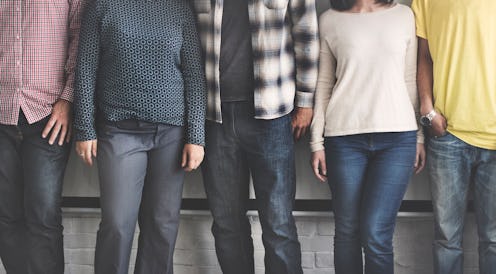While women primarily come to mind in reference to the pay gap, they aren't the only ones earning less. April 4, 2017 is Equal Pay Day, and it's important to understand ways the pay gap affects more than just women. Non-binary people, people with disabilities, LGBTQIA people, and people of color also earn less than cisgender white men.
Equal pay for equal work seem like a no brainer, but both unconscious and conscious bias toward race, sexual orientation, gender identity, religion, and people with disabilities often means earning less for doing the same job. When we talk about the pay gap, it's important to be intersectional, because the 80 cents on the dollar rule applies primarily to straight, white, able-bodied women. Additionally, the National Women's Law Center reported that the average earnings of transgender women workers fall by nearly one-third after transition.
Another report from National Partnership details that Latina women earn 56 cents for every dollar a white man makes, and African American women earn 64 cents. If you're outraged that the myth that everyone has equal opportunities in this country if they work hard continues to overshadow data that proves otherwise, you're not alone. Here are just a few examples of how far we have to go to achieve equal rights for everyone.
1. People With Disabilities Earn More Than 25 Percent Less
Paying women with disabilities less than women without disabilities for performing the same job is a global problem. In the United States the NWLC reported that women with disabilities working full time are typically paid just 72 cents for every dollar men without disabilities are paid. When compared to their male counterparts with disabilities, this figure is 75 cents.
Pro Bono reports that "the attitudinal barriers that people with disabilities face from potential employers and workmates" also keeps them from getting jobs. So not only are they earning less, they are often overlooked during the hiring process, despite being fully qualified.
2. The Wage Gap Negatively Affects The Economy
Paying others less than cisgender white men could spell disaster for the economy. A report from the U.S. Congress Joint Economic Committee released in 2016 found that at the current rate, the gender pay gap won't close until 2059, meaning that until that time women will earn half a million dollars less than men over the course of their careers. This significant lifetime gap trickles down to the economy, affecting retirement security and purchase power for those earning less.
3. Trans Women Earn Less
According to The New York Times, a study published in the B.E. Journal of Economic Analysis & Policy reported that wages for female transgender workers fell by nearly one-third after transition. But, earnings for male transgender workers actually increased slightly after transition.
The study backed up the theory that being female is viewed as negative, while being male is rewarded.
4. Black & Hispanic People Earn Less Than White People
According to the Pew Center for Research, "Among women across all races and ethnicities, hourly earnings lag behind those of white men and men in their own racial or ethnic group. ... Hourly earnings of Asian and white women ($18 and $17, respectively) are higher than those of black and Hispanic women ($13 and $12, respectively) — and also higher than those of black and Hispanic men."
California recently updated its Equal Pay Act to cover gender-related wage issues in January of 2016. In January 2017, the state again updated the act to also preclude wage differentials based on race or ethnicity. However, this doesn't mean everyone is suddenly going to get equal pay. Employers must demonstrate that a wage differential is based on other factors, and it can be hard to prove that an employer is paying someone less because of their race or gender.
5. Some LGBTQIA Workers Earn Less Than Cisgender, Straight White Men
A report from the London School of Economics found that gay men earn less than heterosexual men, and lesbians earn more than heterosexual women but still less than all men.
According to Newsweek, one (albeit bigoted) reason for this is that "employers and customers have a preference working with or doing business with straight men, rather than gay men," and " lesbians may experience less discrimination than straight women because employers perceive them to be less burdened by family and child care responsibilities."
Ugh. These are both examples of reinforcing negative stereotypes. Paying gay men less perpetuates a culture of homophobia, and paying lesbians more punishes women for having families. And, the notion that lesbians don't have families is also ridiculous.
6. Older Workers Earn Less
While the wage gap is well known in Hollywood, especially among older women, people over 65 earn less in most other industries too. According to the brief "Older Women Workers and Economic Security" from the Women's Bureau of the U.S. Department of Labor, the wage gap widens for women 35 and older who earn less than 80 percent of men’s median weekly earnings in each age group. The wage gap is largest for women and men ages 65 years and older, thus putting a strain on retirement options for this population.
This Equal Pay Day, remember there's more to the wage gap than what average statistics show.
